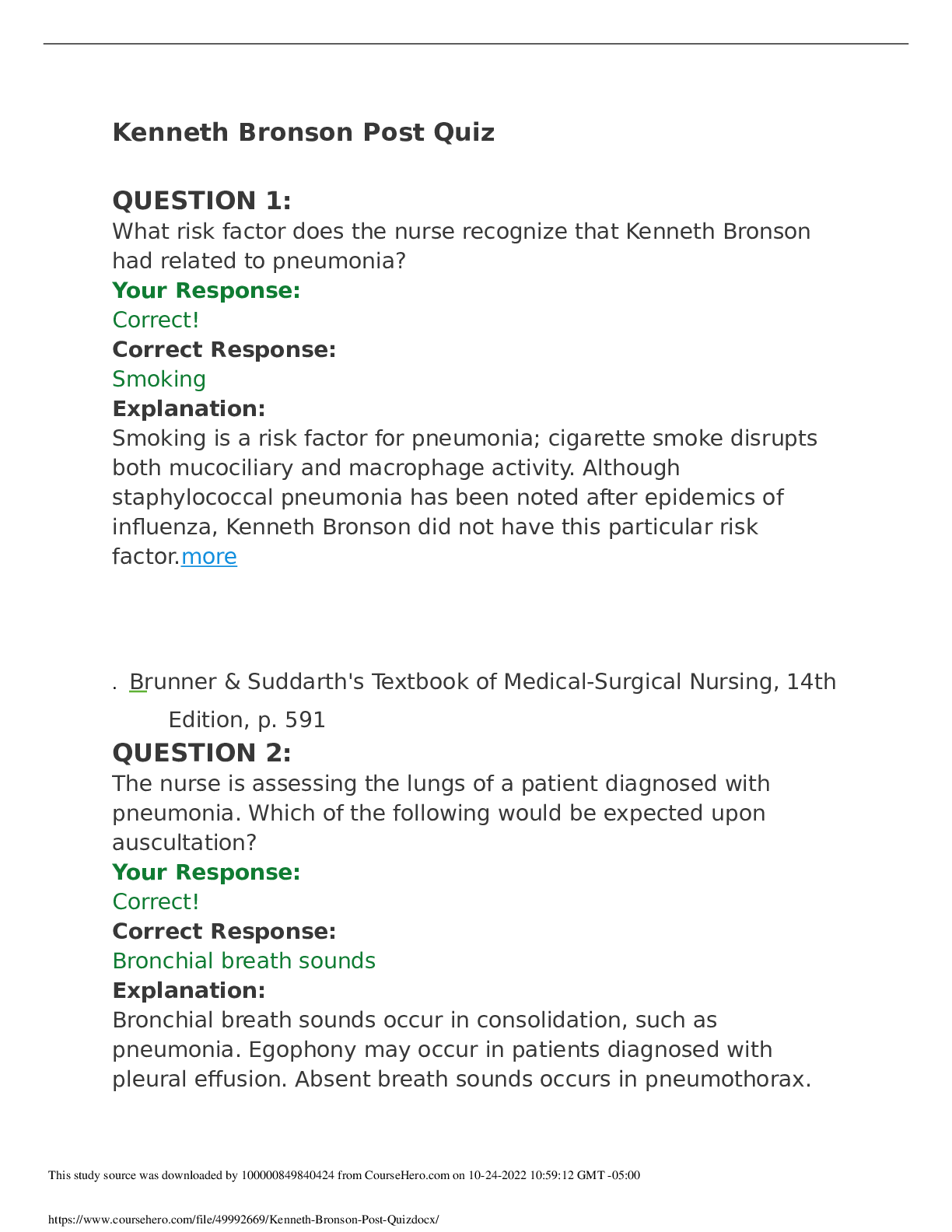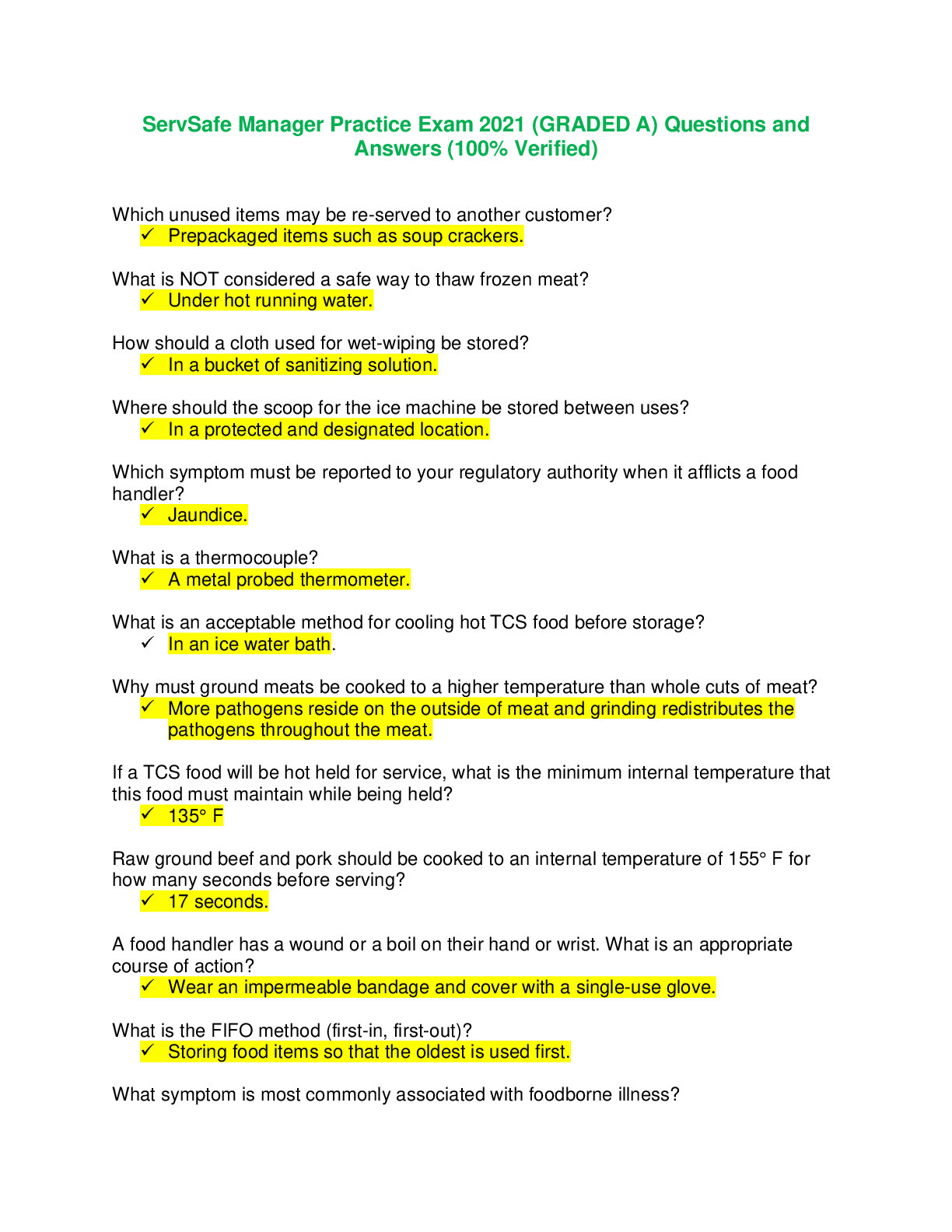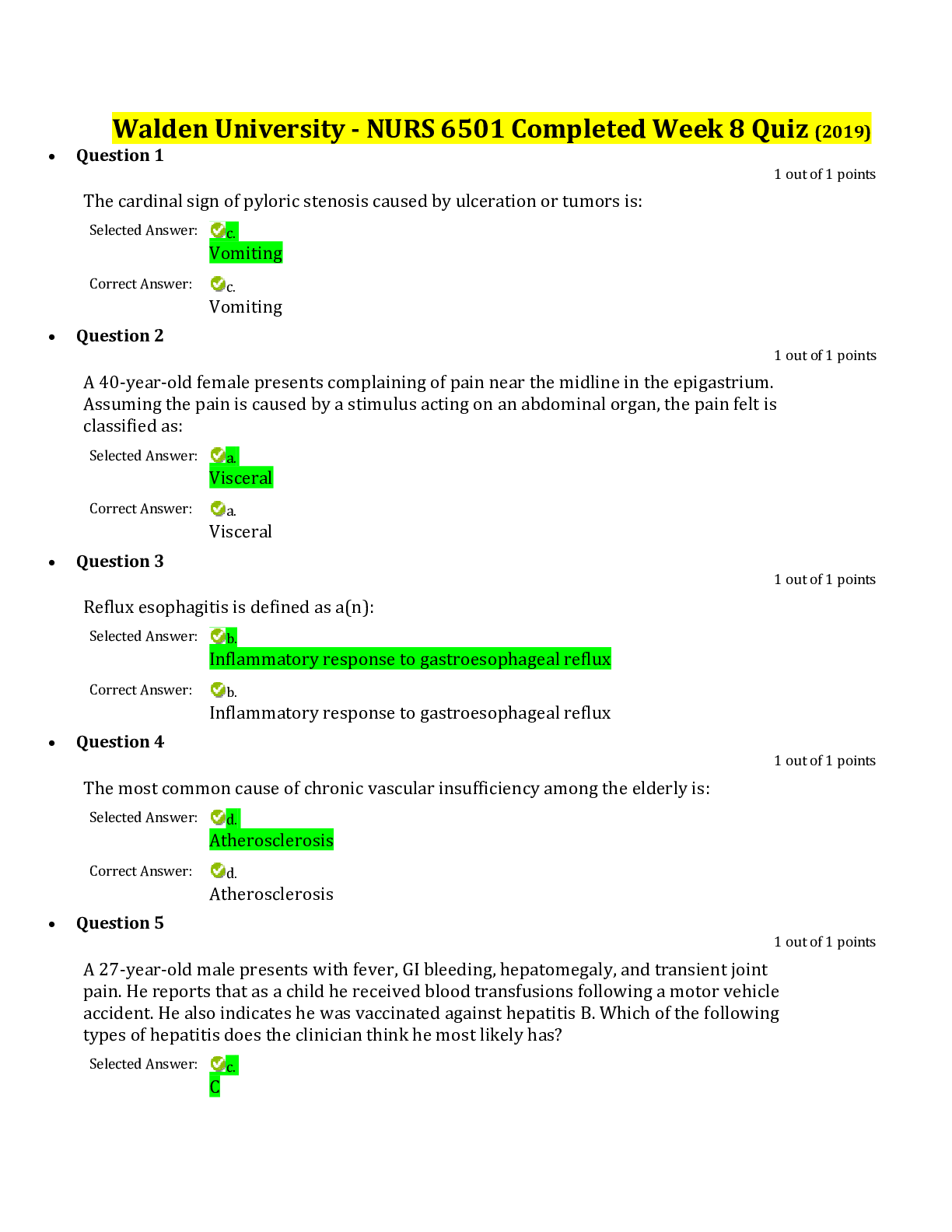Mathematics > EXAM > MATH 221 Statistics for Decision Making Week 4 iLab | Already Graded A+ | Chamberlain College of Nu (All)
MATH 221 Statistics for Decision Making Week 4 iLab | Already Graded A+ | Chamberlain College of Nursing
Document Content and Description Below
Statistical Concepts: • Probability • Binomial Probability Distribution Calculating Binomial Probabilities Open a new Excel worksheet. 1. Open spreadsheet 2. In cell A1 type “s... uccess” as the label 3. Under that in column A, type 0 through 10 (these will be in rows 2 through 12) 4. In cell B1, type “one fourth” 5. In cell B2, type “=BINOM.DIST(A2,10,0.25,FALSE)” [NOTE: if you have Excel 2007, then the formula is BINOMDIST without the period] 6. Then copy and paste this formula in cells B3 through B12 7. In cell C1, type “one half” 8. In cell C2, type “=BINOM.DIST(A2,10,0.5,FALSE)” 9. Copy and paste this formula in cells C3 through C12 10. In cell D1 type “three fourths” 11. In cell D2, type “=BINOM.DIST(A2,10,0.75,FALSE)” 12. Copy and paste this formula in cells D3 through D12 Plotting the Binomial Probabilities 1. Create plots for the three binomial distributions above create the scatter plots in Excel by selecting the data you want plotted and then click on INSERT, CHARTS, SCATTER, and then select the first chart shown which is dots with no connecting lines. Do this two more times and for graph 2 set Y equal to ‘one half’ and X to ‘success’, and for graph 3 set Y equal to ‘three fourths’ and X to ‘success’. Paste those three scatter plots in the grey area below. (9 points) Calculating Descriptive Statistics You will use the same class survey results that were entered into the worksheet for the Week 2 iLab Assignment for question 2. 2. Calculate descriptive statistics for the variable (Coin) where each of the thirty-five students flipped a coin 10 times. Round your answers to three decimal places and type the mean and the standard deviation in the grey area below. (5 points) 3. List the probability value for each possibility in the binomial experiment calculated at the beginning of this lab, which was calculated with the probability of a success being ½. (Complete sentence not necessary; round your answers to three decimal places) (8 points) 4. Give the probability for the following based on the calculations in question 3 above, with the probability of a success being ½. (Complete sentence not necessary; round your answers to three decimal places) (8 points) P(x≥1) 0.999 P(x<0) 0 P(x>1) 0.989 P(x≤4) 0.377 P(4<x ≤7) 0.568 P(x<4 or x≥7) 0.344 5. Calculate (by hand) the mean and standard deviation for the binomial distribution with the probability of a success being ½ and n = 10. Either show work or explain how your answer was calculated. Use these formulas to do the hand calculations: Mean = np, Standard Deviation = (4 points) Mean = np: np = (10)(0.5) = 5 MEAN = 5 6. Calculate (by hand) the mean and standard deviation for the binomial distribution with the probability of a success being ¼ and n = 10. Write a comparison of these statistics to those from question 5 in a short paragraph of several complete sentences. Use these formulas to do the hand calculations: Mean = np, Standard Deviation = (4 points) Mean = np: np = (10)(0.25) = 2.5 MEAN = 2.5 Comparison: The mean, when the probability of success is ½, is higher than the mean with a probability of success of ¼. The standard deviation is also higher when the probability of success is ½, compared to when the probability of success is ¼. This means that when the probability of success is ½ there is a higher average probability of success but there is also a greater variation than when the probability of success is ¼. 7. Calculate (by hand) the mean and standard deviation for the binomial distribution with the probability of a success being ¾ and n = 10. Write a comparison of these statistics to those from question 6 in a short paragraph of several complete sentences. Use these formulas to do the hand calculations: Mean = np, Standard Deviation = (4 points) Comparison: The mean, when the probability of success is ¾, is higher than the mean with a probability of success of ¼ as shown in question 6. The standard deviation however is the same when the probability of success is ¾ and ¼. This means the average probability of success is higher when the probability of success is ¾ versus ¼, but the variation is the same. 8. Using all four of the properties of a Binomial experiment (see page 201 in the textbook) explain in a short paragraph of several complete sentences why the Coin variable from the class survey represents a binomial distribution from a binomial experiment. (4 points) 9. Compare the mean and standard deviation for the Coin variable (question 2) with those of the mean and standard deviation for the binomial distribution that was calculated by hand in question 5. Explain how they are related in a short paragraph of several complete sentences. (4 points) Comparison and explanation: In comparing question 2 and question 5 the mean and standard deviations are similar. I believe this comparison shows that when the 35 students flipped the coin 10 times the success rate of flipping tails is close to the probability of success being ½. [Show More]
Last updated: 2 years ago
Preview 1 out of 6 pages
.png)
Buy this document to get the full access instantly
Instant Download Access after purchase
Buy NowInstant download
We Accept:

Reviews( 0 )
$8.50
Can't find what you want? Try our AI powered Search
Document information
Connected school, study & course
About the document
Uploaded On
Mar 10, 2021
Number of pages
6
Written in
Additional information
This document has been written for:
Uploaded
Mar 10, 2021
Downloads
0
Views
88





 Questions and Answers 100% VERIFIED.png)
 Questions and Answers 100% correct Solutions.png)



















